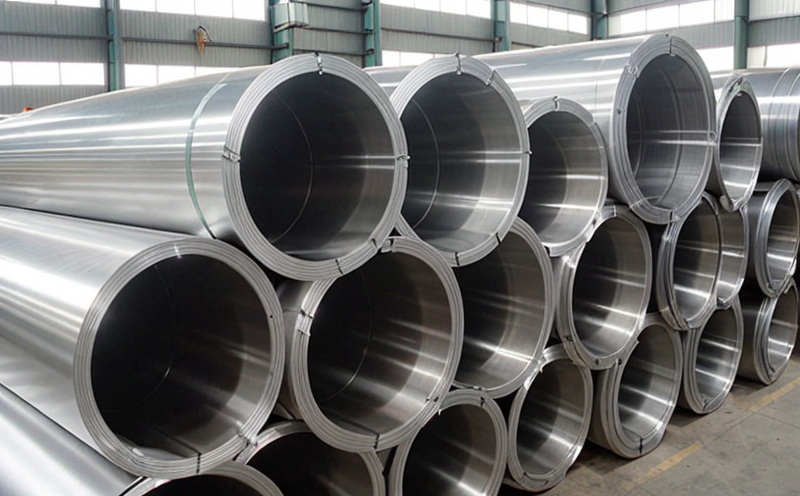Stone Chip Resistance Gravelometer Test
The Stone Chip Resistance Gravelometer (SCR) test is a critical assessment method used to evaluate the resistance of aluminium materials to stone chips. This test is particularly important in sectors such as marine and ship equipment, where durability and performance are paramount. The SCR test is especially relevant for products that will be exposed to abrasive environments like water, salt spray, and other maritime conditions.
The process involves subjecting a specimen of the aluminium material to controlled impacts from a stone chip under specified conditions. The aim is to measure how well the surface can withstand these impacts without compromising its integrity or appearance. This test ensures that materials used in marine equipment meet stringent quality standards for longevity and reliability.
Specimen preparation typically involves cutting the aluminium material into standard-sized samples, which are then mounted on a testing frame. The stone chips used must adhere to specific criteria regarding size, shape, and hardness to ensure consistent and reproducible test results. Once prepared, these specimens undergo rigorous testing in controlled environments that replicate real-world conditions as closely as possible.
The SCR test is an essential tool for manufacturers looking to optimize their products' performance under challenging environmental conditions. By understanding the limitations of different materials through this testing method, engineers can make informed decisions about material selection and design improvements.
Testing conducted using the SCR method provides valuable insights into a material’s resistance to stone chips, which helps in meeting stringent quality control requirements across various industries. This information is crucial for ensuring that products not only meet but exceed industry standards, thereby enhancing overall product reliability and customer satisfaction.
| Applied Standards |
|---|
| ISO 14872:2015 - Determination of Resistance to Stone Chips in Coatings Applied to Aluminium Surfaces |
| ASTM D6973-14 - Standard Test Method for Determining Resistance to Stone Chips in Painted Aluminum Surfaces |
| EN 1082:2015 - Protective coatings and varnishes on aluminium surfaces - Determination of resistance to stone chips |
The application of these standards ensures that the testing process is standardized, making it easier for different laboratories and manufacturers to compare results accurately. Compliance with such internationally recognized guidelines enhances trust in the reliability and accuracy of test outcomes.
Applied Standards
- ISO 14872:2015 - Determination of Resistance to Stone Chips in Coatings Applied to Aluminium Surfaces
- ASTM D6973-14 - Standard Test Method for Determining Resistance to Stone Chips in Painted Aluminum Surfaces
- EN 1082:2015 - Protective coatings and varnishes on aluminium surfaces - Determination of resistance to stone chips
These standards provide a framework for conducting the SCR test, ensuring that all involved parties follow consistent procedures. This consistency is vital in maintaining accuracy and comparability across multiple tests conducted by different facilities.
Benefits
The Stone Chip Resistance Gravelometer Test offers numerous benefits to those responsible for quality assurance within the marine and ship equipment sector:
- Enhanced Durability: By identifying materials with superior stone chip resistance, manufacturers can enhance the durability of their products.
- Informed Decision Making: Testing results provide valuable data that helps in making informed decisions regarding material selection and design improvements.
- Compliance Assurance: Ensures compliance with relevant international standards, thereby meeting regulatory requirements and industry expectations.
- Customer Satisfaction: Products that undergo rigorous testing are more likely to meet or exceed customer expectations, leading to higher levels of satisfaction.
The SCR test is not just about assessing the current state of materials but also serves as a predictive tool. It helps in understanding potential issues before they become critical problems, thus saving time and resources down the line.
Furthermore, by using this test method, companies can ensure that their products are robust enough to withstand harsh marine environments, contributing significantly to the longevity and reliability of marine equipment.
Frequently Asked Questions
International Acceptance and Recognition
- ISO: ISO 14872:2015 is widely recognized globally as the standard for determining stone chip resistance in aluminium surfaces.
- ASTM: ASTM D6973-14 is an American standard that provides a comprehensive methodology for evaluating this property.
- EN: EN 1082:2015 sets out the European standards for protective coatings and varnishes on aluminium surfaces, including stone chip resistance testing.
The international acceptance of these standards ensures that the SCR test results are universally recognized and accepted. This recognition fosters trust among stakeholders and contributes to the harmonization of global quality control practices.





